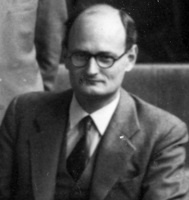
Back ريتشارد ميرفين هير Arabic ار ام هير ARZ Ричард Хеър Bulgarian Richard Hare Mervyn Catalan Richard M. Hare German R. M. Hare Esperanto R. M. Hare Spanish Richard Mervyn Hare Estonian ریچارد مروین هیر Persian R. M. Hare Finnish
R. M. Hare | |
|---|---|
 Hare in 1957 | |
| Born | Richard Mervyn Hare 21 March 1919 Backwell, England |
| Died | 29 January 2002 (aged 82) Ewelme, England |
| Spouse |
Catherine Verney (m. 1947) |
| Children | John E. Hare et al. |
| Academic background | |
| Alma mater | Balliol College, Oxford |
| Thesis | Books: "The Language of Morals" (1952) |
| Doctoral advisor | Gilbert Ryle |
| Other advisors | Gilbert Ryle, H.H. Price |
| Influences | |
| Academic work | |
| Discipline | Philosophy |
| Sub-discipline | |
| School or tradition | Analytic philosophy |
| Institutions | |
| Doctoral students | Denys Turner |
| Notable students | |
| Main interests | |
| Notable ideas | |
| Influenced | |
Richard Mervyn Hare[a] FBA (21 March 1919 – 29 January 2002), usually cited as R. M. Hare, was a British moral philosopher who held the post of White's Professor of Moral Philosophy at the University of Oxford from 1966 until 1983. He subsequently taught for a number of years at the University of Florida. His meta-ethical theories were influential during the second half of the twentieth century.
Hare is best known for his development of prescriptivism as a meta-ethical theory, which he argues is supported by analysis of formal features of moral discourse, and for his defence of preference utilitarianism based on his prescriptivism.
Some of Hare's students, such as Brian McGuinness,[1] John Lucas,[2] and Bernard Williams[3] went on to become well-known philosophers.[4] Hare's son, John E. Hare, also became a philosopher. Peter Singer, known for his involvement with the animal liberation movement (who studied Hare's work as an honours student at the University of Melbourne and came to know Hare personally while he was an Oxford BPhil graduate student),[5] has explicitly adopted some elements of Hare's thought, though not his doctrine of universal prescriptivism.
Cite error: There are <ref group=lower-alpha> tags or {{efn}} templates on this page, but the references will not show without a {{reflist|group=lower-alpha}} template or {{notelist}} template (see the help page).
- ^ Obituaries, Telegraph (9 January 2020). "Brian McGuinness, world-renowned expert on Ludwig Wittgenstein – obituary". The Telegraph. ISSN 0307-1235. Retrieved 13 March 2021.
- ^ Lucas, John Randloph (23 December 2002). "Balliol College – History – Past Members – Richard Hare – A Memoir". Archived from the original on 23 December 2002. Retrieved 8 May 2019.
- ^ McMahan, Jeff (2013). "Bernard Williams: A Reminiscence". The Moral Philosophy of Bernard Williams. Perry, Alexandra; Herrera, C. D. (Christopher D.). Newcastle upon Tyne: Cambridge Scholars Publishing. p. 21. ISBN 9781443866002. OCLC 887508392. Archived from the original on 6 August 2020. Retrieved 8 May 2019.
- ^ Cite error: The named reference
:1was invoked but never defined (see the help page). - ^ Singer, Peter (2002). "R. M. Hare's Achievements in Moral Philosophy" (PDF). Utilitas. 14 (3): 309–317. doi:10.1017/S0953820800003629. ISSN 1741-6183. S2CID 145757614. Archived from the original (PDF) on 8 September 2006.